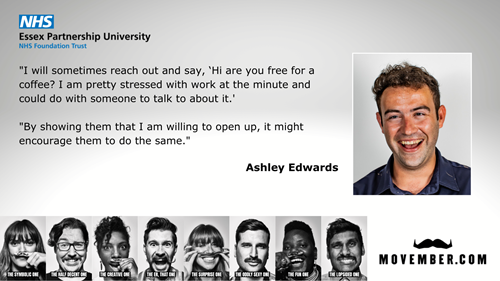"By showing people I am willing to open up, it might encourage them to do the same"
Movember is a month long awareness event which takes place throughout November each year. It's aimed at raising awareness of men's mental and physical health.

As part of Movember, we'll be hearing from male colleagues about how they look after their wellbeing and how they look out for others. We spoke to Ashley Edwards, Clinical Lead Speech and Language Therapist for the South East Essex Dementia Service, and you can read his blog below:
Preferred name:
Ashley Edwards (always Ashley, never Ash!)
Job role:
Clinical Lead Speech and Language Therapist for the South East Essex Dementia Service and Chair of LGBTQ+ Network Group.
What does your role at EPUT entail?
I offer swallow assessments and interventions for patients with dementia in care homes, their own homes or day centres along with a team of fantastic SLTs.
What do you like most about working here?
The comradery with the other staff and that every patient is so different, and you have no idea who you will be meeting next.
How do you look after your physical and mental wellbeing?
I could probably be better at looking after my physical and mental wellbeing. But I love a podcast and so I only allow myself to listen to a podcast if I am going for a walk, so walking is how I stay healthy. I go for at least 30 minutes of brisk walking a day. As for mental health, maybe an odd one but I love performing stand-up comedy and doing improv comedy. I can't think of anything more enjoyable that this, my mind goes clear, and I do not think about any of my stresses! I also love baths. Megatons of bubbles and you're winning.
What do you enjoy doing outside of work?
Stand-up comedy, pub quizzes, improv comedy, seeing shows and seeing friends. Video games are also a small passion for the short-term wins.
In what ways do you look out for your male family members, friends and colleagues?
I always talk openly and honestly, no matter the gender. I adapt my language and communication style, reflect back at them what they have said or how they have seemed recently, to highlight that they may benefit from a coffee and a natter.
How would you spot the signs that someone might not be ok?
Sometimes it is the changes in routine, but behaviour that is not typical for them with no explanation. I am not expecting someone to be sobbing all the time, more someone who is listless or not themselves, someone who backs out on plans or drinks more etc.
What would you say to encourage your male family members, friends and colleagues to look after themselves and reach out if they need to?
I do it by demonstrating it. I will sometimes reach out and say 'Hi are you free for a coffee? I am pretty stressed with work at the minute and could do with someone to talk to about it' or words to that effect. By showing them that I am willing to open up, it might encourage them to do the same.
Tell us an interesting fact.
The person who took my photo is Tony Winter, a community dementia nurse in our service. Talented, eh?
